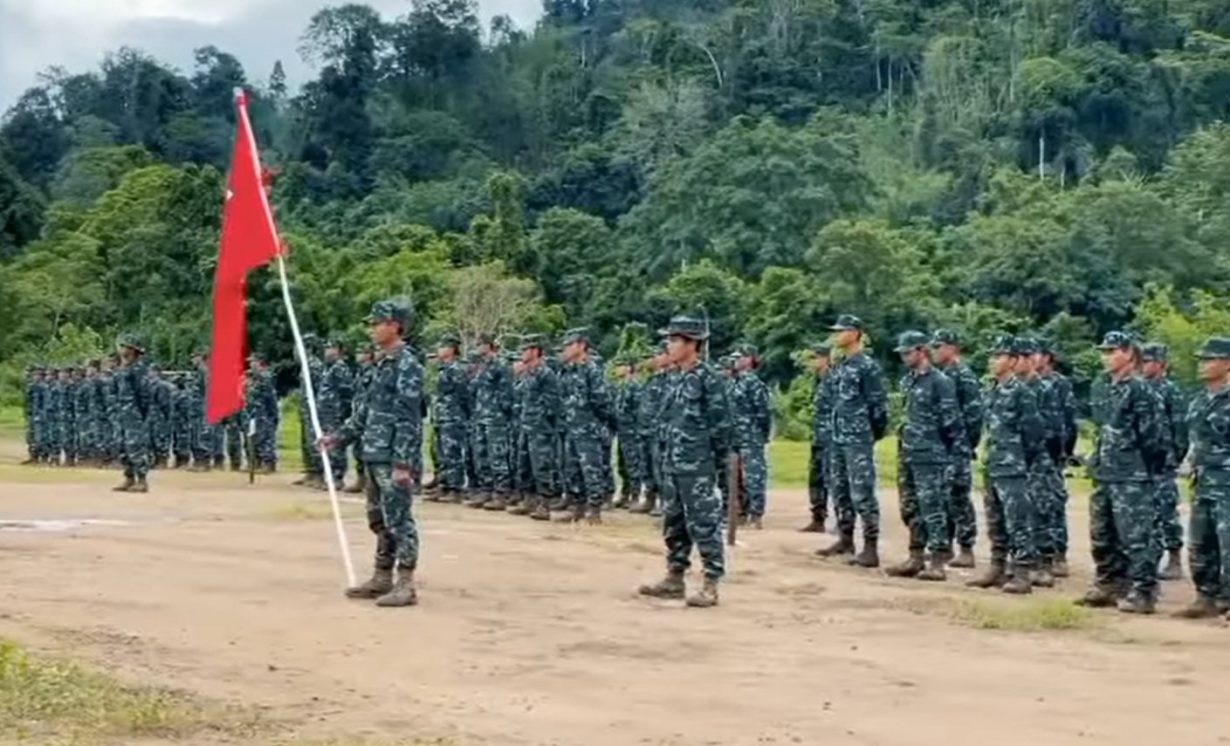Credited with attempting to broker peace in the war-struck country of Myanmar, China has now sternly reiterated its request for a ceasefire in northern Myanmar after errant artillery fire struck a town on the Chinese side of the border amid intensifying combat between the military junta and rebel groups.
Beijing “strongly deplored” the event, according to Foreign Ministry spokesperson Wang Wenbin, who also said China would take all necessary steps to safeguard its citizens’ lives and property, Chinese state media CGTN reported on January 4.
Shells fired from northern Myanmar struck Nansan, a town in Yunnan province, on January 4. Nansan is located around 2.5 kilometers from the border. Some citizens narrated accounts of windows breaking and walls collapsing due to the explosions. At least five Chinese citizens were hurt in the event and are said to be currently receiving treatment in a hospital.
This is not the first time that Nansan has borne the brunt of the instability across the border. Previously, when violence broke out in northern Myanmar, Nansan was caught in the crossfire, including an incident when five people were injured.
Speaking on behalf of the ministry, Wang Wenbin stated that China is keeping a close eye on the situation in northern Myanmar, where armed groups and the military of Myanmar have been fighting nonstop despite diplomatic efforts. The spokesperson called for an immediate ceasefire.
China has lodged solemn representations with the relevant parties over the incident in which artillery shells from Myanmar fell into Southwest China's Yunnan Province, causing injuries on Wednesday. China once again called on the parties involved in the conflict in northern… pic.twitter.com/eyjefw6428
— Global Times (@globaltimesnews) January 4, 2024
“We have already lodged a serious protest with the relevant parties, and we once again asked all parties in the conflict to stop fighting immediately and take concrete actions to avoid similar appalling incidents from disrupting the tranquillity of the Chinese-Myanmar border,” Wang said.
The two administrations have maintained a cordial relationship, although Myanmar has been internationally reprimanded for its unprecedented 2021 coup that triggered the civil war.
🚨🪖 Report 🇨🇳:
The severe conflict in northern Myanmar has caused many casualties on the Chinese side too
The Chinese Ministry of Foreign Affairs said : China is strongly dissatisfied and has lodged a solemn protest with the relevant parties
Chinese citizens across the… pic.twitter.com/ETLwGf863z
— OsintTV 📺 (@OsintTV) December 31, 2023
Although China has not bothered itself in a big way by getting involved in the conflict or censuring the Junta administration that deposed the lawfully elected Aung San Suu Kyi government in 2021, the fighting close to its border may have rattled the country on account of security threats.
In early November, for instance, a Chinese official said that Myanmar should cooperate with China to maintain stability on their shared border amid a surge in hostilities. At the time, the junta administration assured Beijing that it was working to restore order in the border area.
Beijing is concerned because a large portion of the fighting is occurring along Myanmar’s border with China, impeding cross-border trade. Additionally, it could further destabilize Myanmar’s political system.
China has been collaborating with both sides to mediate a truce and has previously encouraged all parties to quit hostilities. The representatives of Myanmar’s ruling military have conducted discussions with them, aided by China, according to a junta official quoted by state media last month.
“Myanmar’s National Unity and Peacemaking Coordination Committee met with representatives of MNDAA, TNLA, and AA with the help of China,” said Zaw Min Tun, according to MRTV’s Telegram channel. “Based on the development of the conversation, there will likely be another meeting at the end of this month.” The acronyms are attributed to the rebel group trio.
Myanmar Military Is Overwhelmed
Since the Arakan Army, the Ta’ang National Liberation Army, and the Myanmar National Democratic Alliance Army—collectively referring to themselves as the Three Brotherhood Alliance—launched a concerted offensive on October 27, fighting has been ongoing in the northern section of Shan state.
Since the army overthrew Aung San Suu Kyi’s democratic government in February 2021, their attacks have presented Myanmar’s military leadership with their biggest war test to date.
The alliance’s offensive dispersed the military’s soldiers around the country, igniting a fresh battle between the pro-democracy Peoples Defense Force and its supporters, as well as other armed ethnic minority groups.

The Myanmar Army is believed to be having a tough time fighting the insurgents, especially close to the Chinese border. According to reports last month, an army captain bemoaned that he had never witnessed such fierce battle while fighting in a jungle region close to China’s northeastern border.
“I have never faced these kinds of battles before,” the combat veteran told The Associated Press by phone.
The military, taken aback by the assault known as Operation 1027, had lost over 180 outposts and strongholds, including four significant bases and four strategically significant border crossings with China as of December 1. These losses are expected to have been multiplied ever since, as the junta is believed to be overwhelmed.
Both parties assert that they have severely damaged the other, yet precise death toll data is unavailable. According to the UN, the conflict has resulted in the displacement of about 335,000 civilians, raising the total number of displaced people in the country to over 2 million.
According to reports, more troops are surrendering and defecting due to its unexpectedly rapid and widespread losses and overstretched forces, causing morale to decline and inspiring cautious optimism among its varied opponents.
According to analysts, the military is currently at its weakest point since the coup, and some even predict its impending collapse. However, the fighting has created a massive humanitarian condition, with several thousands internally displaced. China’s calls for a ceasefire, thus, are necessary for objectives that go far beyond the tranquillity along the common border.
- Contact the author at sakshi.tiwari9555(at)gmail.com
- Follow EurAsian Times on Google News